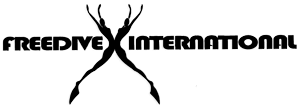Alexey Molchanov is very often spending time in Dahab and we have known him since he was 17! He was already freediving deep then but wasn’t allowed to compete yet. This January Alexey came for some training and brought some monofins to our shop; our instructor and blogger Pavol met him for an interview. We hope you enjoy it and find some new interesting insights:)
Now that the depth season is over I got a chance to meet with Alexey Molchanov and had a chat about freediving to share views, experiences and ideas about this beautiful sport. Alexey is multiple world record holder. I met with Alexey in small coffee shop in Dahab, not even an hour after he returned from his training at the Blue Hole. He arrived on his motorbike with an equipment bag and a big smile on his face.
Me: So, few weeks ago you returned from Vertical Blue at Bahamas. We have followed your progress and seen that you were trying to do new a new World Record in CNF (constant weight without fins)by beating the standing record of 101 meters, but unfortunately you didn’t succeed. Tell me, how was it? How was your experience?
Alexey: It wasn’t going so well (laughed). I mean it is hard to say, because it was very deep for this discipline. I made one or two small mistakes that affected the dive. During my training I did this depth and all my dives were solid, clean dives.
On my last day I did -88m and it was very easy.
Me: I noticed there was a change in the weather conditions during the competition, did this affect you in any way?
Alexey: No, it didn’t affect me. I wear a full long sleeve wetsuit, so I didn’t feel it so much. Maybe some other divers felt it much more than me, since they were diving without hood. Also I am not so skinny so I don’t get cold so quick (laughs). Also personally I found out that I need to keep doing some power training during season to keep the muscles. Because when I lose muscles my speed also drops, especially during CNF discipline. As I arrived to Bahamas I was going swimming, not too much, just to stay in shape.
Me: What is your personal opinion on combining power training and freediving, during season?
Alexey: I do go to the gym as part of my training. For example during Caribbean Cup, when I was resting for the whole day, I felt weak, lazy and not so sharp, like when you have low blood pressure. The first day I had a bad dive (-96m CNF). I wanted to do something about it, so I went to the gym doing about 40%-50% weights, easy reps, but I was still sweating. And it went well, next day I did a good strong dive -96m. It was a surprise to me. Maybe it won’t work for people with low muscle mass, but I need it to wake up my muscles a little bit (laughs).It is a very personal thing, depends of body type, there is no recipe that works for everyone.
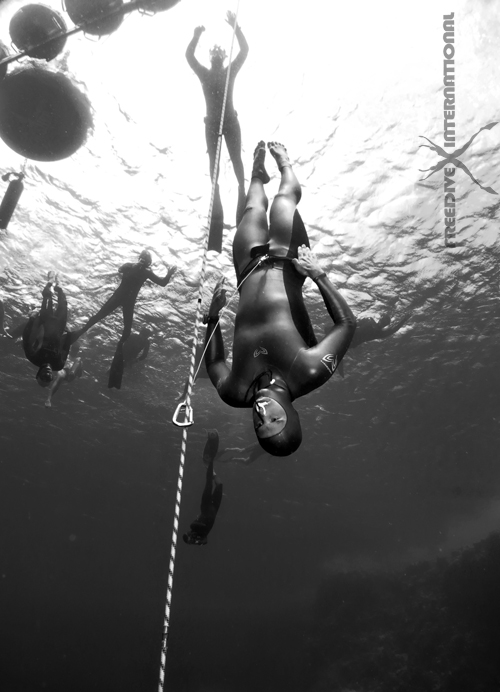
Above Alexey on the way down during a successful 90 meters CNF dive,
achieved in May 2014 during the Russian Championship, hosted at
the Blue Hole by Freedive Dahab – Photo by Linda Paganelli.
Me: How do you feel in relation to lactic acid during your dives?
Alexey: I don’t feel lactic acid so much, maybe only after the dive. During the dive I struggle with other things, like high CO2, narcosis and hypoxia, but I don’t have a problem with lactic acid.
Me: You do a lot of pool disciplines, how do you mix it up? Do you prefer depth training or pool training?
Alexey: I like depth a lot. I like the pool because it tires you less, while when I train depth it exhausts me a lot. Diving deep drains a lot of power and energy, so I need to rest for the entire day. In this sense I like pool training more. When you train the pool disciplines you have to struggle more, you need to push more. Some people struggle less than others or they like this, so they prefer to do pool disciplines. For me it is easier to do depth, that is why I like depth more. Pool disciplines are maybe harder, but they don’t tire you so much as depth. It is easier for me to push with depth disciplines and harder to push in the pool. Maybe I don’t train so much pool disciplines as I should…you better watch out Goran Colak!(laughs). I have concentrated on depth for last 5-6 years, but I do train in the pool as well, like when I am in Moscow. I feel good after hard pool training.
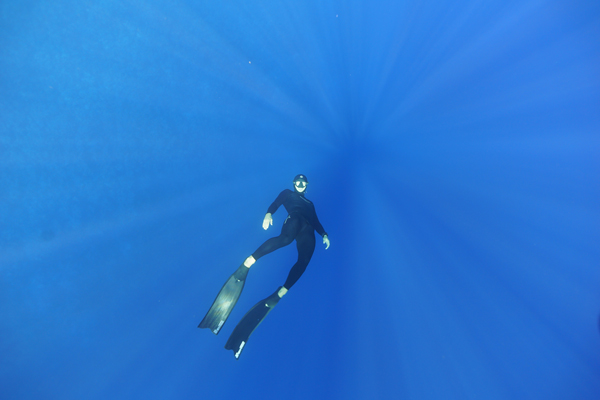
Alexey gliding in Dahab’s Blue Hole – photo by Nadya Borozdenkova
Me: Have you trained Apnea cycling?
Alexey: No, but I started to try apnea running. Yesterday I was running for some 15 minutes and doing around 8 breath-holds for only something like 25 seconds then rest for 35 seconds. Then I ran for about 10 minutes just to cool down at the same speed, around 9-10 km/h. Then I felt like I can run forever, after the breath-hold felt so good to breathe again (laughs). I am only trying this method of training just now. I used to swim a lot in past.
Me: You are training a lot, obviously. You like to train, but what motivates you to keep training, to keep pushing?
Alexey: I trained all my life, since I was a kid. Also, knowing that I can do well and I can improve motivates me. I also enjoy the competitive part, where I know that other guys around the world train hard and they are pushing their limits, so I want to keep up with them. It’s like a game (smiles).
Me: On your way to current depth, did you “hit a wall” at some point? Like a problem that took you a while to overcome?
Alexey: I didn’t have any huge problem that would stop me, maybe something like few months or half year but no longer than that. Yes, I struggled with equalization, when I hit -70 meters. Then I learned mouthfill technique, which solved it. Next problem I had was hypoxia, I could equalize, but my body wasn’t ready, dive time was a problem at that point, which was around -100 meters. I was slowly progressing all the time. I never had a problem with lung squeeze, I think because I started freediving early when I was young and my body adapted to pressure much easier than other freedivers who are older. My rib cage was always very flexible, I was lucky that I started young.
Me: How did you overcome your problem with hypoxia?
Alexey: Time and distance became an issue. Training preparation breathing, recovery breathing. Breathe-up is an important part to train: breathing right to prepare for a dive is very important.
Me: Was this where you made a mistake on your CNF dives in the Bahamas competition?
Alexey: No. Breathing was ok. It was my speed and strength. I was too slow. It is not only extra 10 seconds on the way up, but this adds up and if muscles were not in good shape they also consumed more oxygen.
Me: Do you train with your mum, is she an ultimate buddy? How does it work to train with mum?
Alexey: I train with her in the pool, actually in depth as well. Whenever we are together, we also train together. She follows her own routine and I do mine, but we talk about our training and we exchange opinions. She is really strong in the pool disciplines. For me training with her is normal, because I was training with my mum all my life, I don’t know how it is not to. My parents started teaching me how to swim since the age of 3. They were my coaches. I was in my best swimming form while trained by my mum. When I trained with other trainers my results were not as good. Maybe it is because she knows me very well, she knows my speed of recovery, everything. Or maybe it’s just because she is a very good trainer
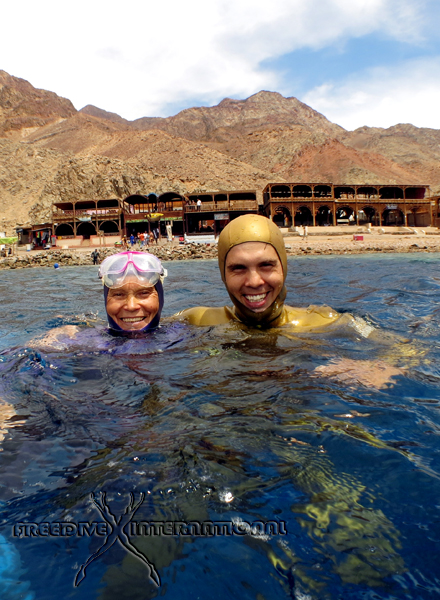
Alexey’s and his mother Natalia happy smiles after she broke her
own world record in CNF with a dive to 70 meters. Photo by Linda Paganelli
Me: Lots of people think that freediving is a dangerous and extreme sport, would you agree?
Alexey: If you have no knowledge about it, for sure it could be dangerous. Losing consciousness under water, if you have no safety diver, will make you drown. But you can say that for a lot of other activities, like mountain hiking, if you go to the mountains by yourself without any knowledge about it you can be killed easily. Or you don’t know how to swim and you go to swim in big waves, same thing. You need to get proper training, even a short training, like few days courses, it really will make it safer and you can enjoy it better. And if you stay within your limits you will be safe. Also at professional level, records show that it is not a dangerous sport. We only had one accident in 20 years of competitions. There are other sports that have much worse records and yet many people are doing it. Of course it is a young sport, but it is growing and with it knowledge and safety are growing, too. Education systems are developing and updating all the time, to keep the sport safer. Of course, there are people that are always pushing risks and are reckless, but then it is down to individual.
Me: With so much information online, what would be your advice to people that want to try freediving?
Alexey: I am very supportive; I would recommend everyone to try freediving. There is lot of information on the internet, but it is hard for a newbie to say if it is correct information or not. It is good that there is so much stuff about freediving online, because it gets people interested, but then it is up to individual what he decides to do with that information. Sometimes it could be outdated information and you can’t rely on it, and sometimes you can. But you don’t know, so this is unsafe. It’s for sure better to go to an instructor, but it has to be a good instructor. Many times, there might not be any school or instructor around, so it is easier to rely on internet. Of course it is better to have a professional to give you feedback and solve your problems, as internet cannot do that for you.
Me: What do you think the future holds for freediving?
Alexey: I hope that training methods and safety develops more. I hope freediving will be better known in eye of the public and will be seen as safe sport, not extreme and dangerous. And I hope that people will see what a nice activity freediving is and that they can learn its basics in a short space of time. And that they will see that you don’t necessarily need all this heavy equipment to enjoy the sea and that it also promotes healthy lifestyle.
It was great to catch up with Alexey and I have to say from my chat with him he certainly represents well the top elite of freedivers and freediving in what it truly is: a peaceful, friendly and interesting sport. Best of luck Alexey!
Find more info about Alexey and his freediving career on his website
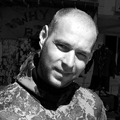
Written by Pavol Ivanov, awesome instructor at Freedive International
